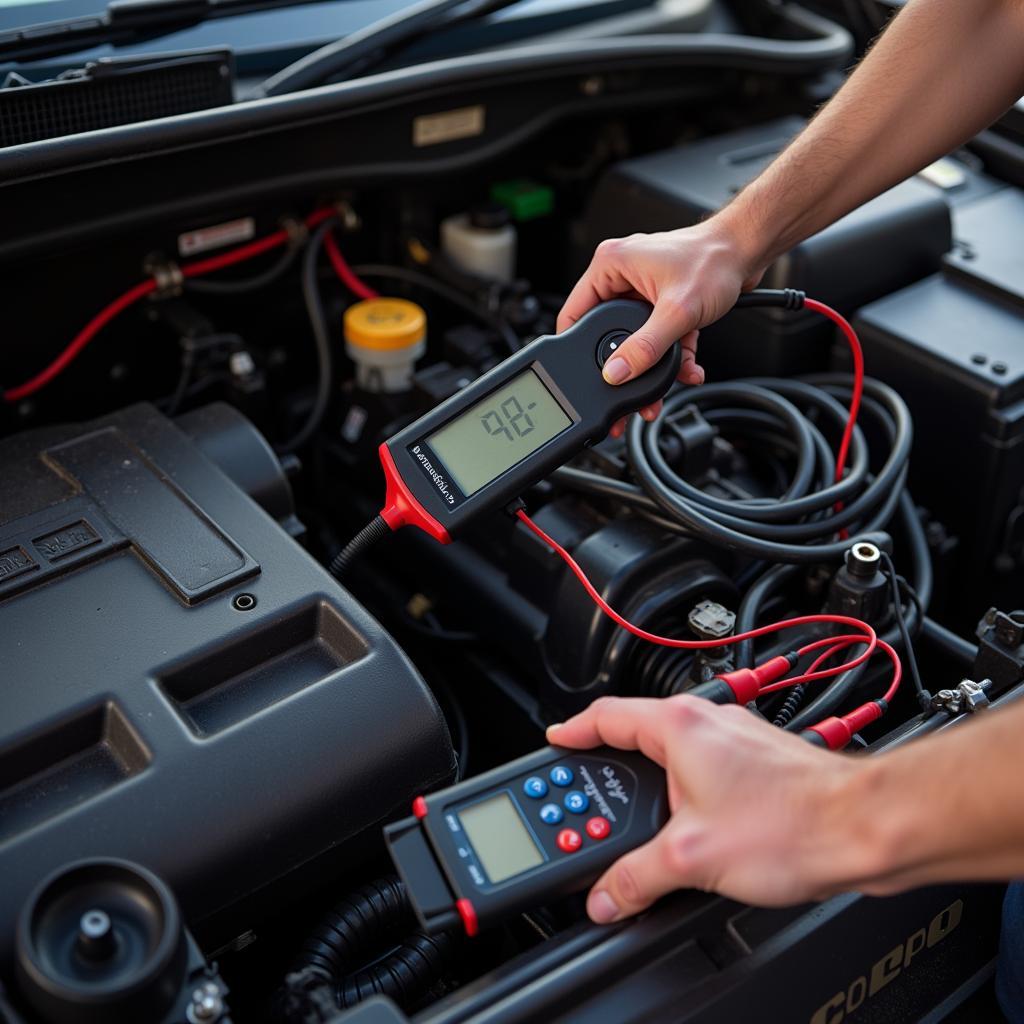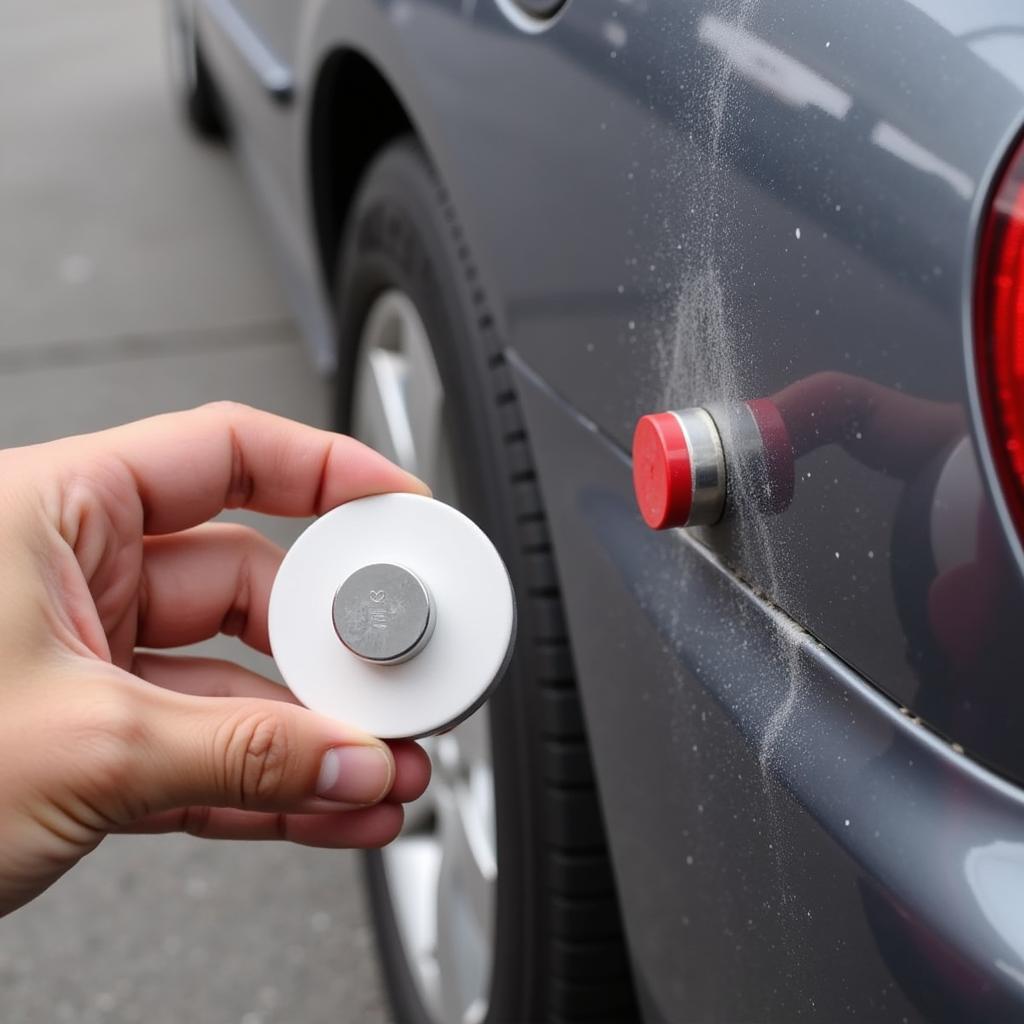Buying a used car can be a smart financial move, but it’s crucial to inspect it thoroughly before handing over your hard-earned cash. Knowing which Tools To Bring To Inspect A Used Car can make all the difference between a great deal and a lemon. A proper inspection will empower you to identify potential problems and negotiate a fair price.
A handy tool to have is a code reader, like the ones reviewed on DiagFixPro. Check out our review of the car wifi obd 2 obd2 obdii code reader scan tool. This allows you to read diagnostic trouble codes (DTCs) stored in the car’s computer, revealing potential hidden issues.
Essential Tools for a Thorough Used Car Inspection
A thorough inspection requires more than just a keen eye. Having the right tools can uncover hidden problems and give you the confidence to make an informed decision. These tools range from simple items to more specialized diagnostic equipment, each playing a critical role in assessing the car’s condition.
Mechanical Inspection Tools
- Flashlight: A powerful flashlight is indispensable for checking dark areas like the engine bay, undercarriage, and inside the trunk. Look for rust, leaks, and any signs of damage.
- Mirror on a Stick: This simple tool allows you to see hard-to-reach areas like the underside of the engine and suspension components. It’s invaluable for detecting rust, leaks, and other potential issues.
- Tire Pressure Gauge: Checking tire pressure is essential for safety and fuel efficiency. Uneven tire wear can also indicate alignment problems.
- Jack and Stands: These are crucial for safely inspecting the underside of the car. Never work under a car supported only by a jack.
- Screwdrivers and Wrenches: A basic set of screwdrivers and wrenches can be useful for removing covers or panels to access specific components for closer inspection.
Diagnostic Tools
- OBD-II Scanner: An OBD-II scanner, like the wifi obd2 car diagnostics tool, can read diagnostic trouble codes (DTCs) from the car’s computer. This can reveal potential problems with the engine, transmission, and other systems.
- Multimeter: A multimeter can measure voltage, current, and resistance, helping to diagnose electrical problems.
- Mechanic’s Stethoscope: This tool can help pinpoint the source of unusual noises coming from the engine or other mechanical components.
What diagnostic tools are essential? An OBD-II scanner, a multimeter, and a mechanic’s stethoscope are crucial.
 Diagnostic Tools for a Used Car Inspection
Diagnostic Tools for a Used Car Inspection
Other Useful Tools
- Magnet: A magnet can help you determine if body panels have been repaired with filler (Bondo), which could indicate previous damage.
- Paint Thickness Gauge: This tool can measure the thickness of the paint on the car’s body, helping to identify areas that have been repainted, potentially due to accident repairs.
What other tools might be helpful? A magnet and a paint thickness gauge can reveal prior bodywork. For a comprehensive look at various tools, consider Eric the Car Guy ETCG tool comparison. Another valuable resource is our article on the car 4 way tool.
 Additional Tools for Inspecting a Used Car
Additional Tools for Inspecting a Used Car
Conclusion
Inspecting a used car with the right tools empowers you to identify potential problems and negotiate confidently. By using these tools to bring to inspect a used car, you’ll be well-equipped to make an informed decision and avoid costly surprises down the road. Don’t forget to check out DiagFixPro for further information and reviews on diagnostic tools.
FAQ
- What is an OBD-II scanner? An OBD-II scanner is a diagnostic tool that reads trouble codes from a car’s computer.
- Why is a flashlight important? A flashlight helps inspect dark areas for rust, leaks, and damage.
- What does a tire pressure gauge indicate? It checks tire pressure and can reveal uneven wear, indicating alignment issues.
- What’s the use of a mechanic’s stethoscope? It helps pinpoint unusual noises in the engine or other components.
- How does a magnet help in the inspection? A magnet detects body filler, suggesting possible prior damage.
Need more help? Check out our article on cara membaca scs tool.
Contact us for support via WhatsApp: +1(641)206-8880, Email: [email protected], or visit us at 910 Cedar Lane, Chicago, IL 60605, USA. Our customer service team is available 24/7.

Leave a Reply